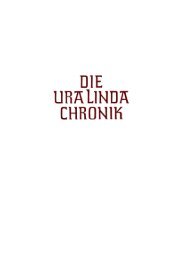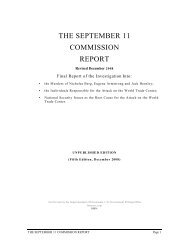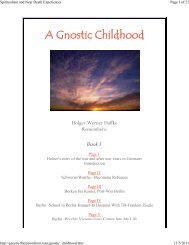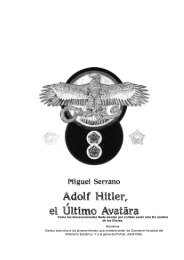- Page 2 and 3:
CONTENTS Introductory Explanations
- Page 4 and 5:
INTRODUCTORY EXPLANATIONS When the
- Page 6 and 7:
our tormentors really are. Not bein
- Page 8 and 9:
CONSENSUS TRANCE Malta yok is Turki
- Page 10 and 11:
Waking up from the trance is a diff
- Page 12 and 13:
The Swedish Association Save the In
- Page 14 and 15:
enough for the Church to consider i
- Page 16 and 17:
conventional biology becomes intrin
- Page 18 and 19:
He praised the drug and handed it o
- Page 20 and 21:
A rich, jealous and amoral potentat
- Page 22 and 23:
trouble during the first orbit, and
- Page 24 and 25:
On 12 April 2001, the Russian senio
- Page 26 and 27:
patterns: in spirals around the mag
- Page 28 and 29:
THE DARK HISTORY OF THE KNIGHTS TEM
- Page 30 and 31:
One of the kings was Guillem de Gel
- Page 32 and 33:
The name Prieure de Sion did not ap
- Page 34 and 35:
that they knew the knights were god
- Page 36 and 37:
lack mantle. The knights of the ord
- Page 38 and 39:
taught women how to perform abortio
- Page 40 and 41:
needed new blood sacrifices. This w
- Page 42 and 43:
According to modern historians, all
- Page 44 and 45:
The Curse of the Grand Master The l
- Page 46 and 47:
passing through a series of degrees
- Page 48 and 49:
for Francois de Guise, Duke of Lorr
- Page 50 and 51:
THE RISE OF FREEMASONRY The art of
- Page 52 and 53:
country was divided between the Cat
- Page 54 and 55:
estricted by the feudal lords. Inst
- Page 56 and 57:
qualified to take part in the work.
- Page 58 and 59:
fees to enter the lodges. This was
- Page 60 and 61:
At the beginning of the 17th centur
- Page 62 and 63:
the masonic lodges and exploit them
- Page 64 and 65:
to found a Grand Lodge in London (F
- Page 66 and 67:
more effective disguise. The freema
- Page 68 and 69:
Holy Crown'. The cabbalist numerolo
- Page 70 and 71:
the temple wall. He is still praise
- Page 72 and 73:
The masonic movement seemed like an
- Page 74 and 75:
dollar bill is built of 33 stones.
- Page 76 and 77:
collection of teachings, rabbi Bech
- Page 78 and 79:
This is also the reason why cabbali
- Page 80 and 81:
Acts of vengeance were staged once
- Page 82 and 83:
injection but it doesn't go away. A
- Page 84 and 85:
Washington, D.C., not far from the
- Page 86 and 87:
Other Masonic Rites Freemasonry off
- Page 88 and 89:
Swedish Order of Freemasons), you c
- Page 90 and 91:
These sick patterns of behaviour sh
- Page 92 and 93:
At this time, King Gustavus IV Adol
- Page 94 and 95:
In 1809, two separate magic systems
- Page 96 and 97:
The newly initiated is made to swea
- Page 98 and 99:
The compass gave the freemason a fr
- Page 100 and 101:
The British structural engineer Dav
- Page 102 and 103:
and white chequered patterns. If on
- Page 104 and 105:
god listened to her and sent Thoth
- Page 106 and 107:
Naturally they began to use the all
- Page 108 and 109:
During initiation into the 4th degr
- Page 110 and 111:
dogma or disorienting ideas, revolu
- Page 112 and 113:
Tarkovsky visited Stockholm when "T
- Page 114 and 115:
associations (white magic) and decr
- Page 116 and 117:
Modern magicians regard this system
- Page 118 and 119:
In 1835, the freemasons finally ere
- Page 120 and 121:
The freemasons erected an obelisk (
- Page 122 and 123:
On 4 June 1963, President John F. K
- Page 124 and 125:
The author Harry Livingstone, who w
- Page 126 and 127:
The esoteric explanation for this p
- Page 128 and 129:
knowledge of magic is using a frequ
- Page 130 and 131:
a shrine to Satan. The walls were c
- Page 132 and 133:
The freemasons are struggling to ac
- Page 134 and 135:
THE POWERFUL FINANCIAL SPHERE Lendi
- Page 136 and 137:
eceive part of the profit. If there
- Page 138 and 139:
as much as 10 pre cent. After the s
- Page 140 and 141:
By the year 1698 the national debt
- Page 142 and 143:
fact that the Constitution had give
- Page 144 and 145:
The assassination of Abraham Lincol
- Page 146 and 147:
Schiff, who also belonged to B'nai
- Page 148 and 149:
In the 1810s, the freemasons had br
- Page 150 and 151:
walls, roads, the new marketplace,
- Page 152 and 153:
The German-Argentine economist Silv
- Page 154 and 155:
euros a month. Craftsmen usually re
- Page 156 and 157:
men in the world. Hiss assets are r
- Page 158 and 159:
THE GLOBAL POWER OF FREEMASONRY The
- Page 160 and 161:
"The main part of our work takes pl
- Page 162 and 163:
expose the fraud of a masonic broth
- Page 164 and 165:
Whereas the British lodges still ou
- Page 166 and 167:
Jakob von Manvillon who had plans f
- Page 168 and 169:
The Illuminati General Adam Weishau
- Page 170 and 171:
As the Illuminati ban was proclaime
- Page 172 and 173:
The Illuminati candidate had to und
- Page 174 and 175:
Several ignorant writers have claim
- Page 176 and 177:
In 1886, the masonic brother Gonnou
- Page 178 and 179:
Officially the freemasons had no in
- Page 180 and 181:
"At the international Masonic Congr
- Page 182 and 183:
muurarein kadonnut sana" / "The Los
- Page 184 and 185:
Russian History", Moscow, 1999, p.
- Page 186 and 187:
general of freemasonry for North Am
- Page 188 and 189:
of the Massachusetts freemasons. In
- Page 190 and 191:
Giuseppe Mazzini sent a letter to A
- Page 192 and 193:
Albert Pike - leader of world freem
- Page 194 and 195:
In 1901, Theodore Roosevelt became
- Page 196 and 197:
When Theodore Roosevelt visited Ita
- Page 198 and 199:
In 1941, he was appointed honorary
- Page 200 and 201:
Tony Benn (prior to 1964 Sir Antony
- Page 202 and 203:
adults and children were sacrificed
- Page 204 and 205:
(Michael J. Goy, "The Missing Dimen
- Page 206 and 207:
called "Nixon and the Great Sociali
- Page 208 and 209:
In the early 1960s, however, a seri
- Page 210 and 211:
then tried to strangle Ellen Kaplan
- Page 212 and 213:
analysed the secret role of freemas
- Page 214 and 215:
freemasons Louis B. Mayer (Metro-Go
- Page 216 and 217:
3450 masons in 52 lodges, in Hollan
- Page 218 and 219:
All African political leaders are f
- Page 220 and 221:
and the CIA within the freemasonry,
- Page 222 and 223:
documents crude oil was sold instea
- Page 224 and 225:
Italian freemasonry was going to se
- Page 226 and 227:
On 8 May 1981, an investigation was
- Page 228 and 229:
1963-1968 and 1974-1976, and later
- Page 230 and 231:
It was evident that P2 was indirect
- Page 232 and 233:
London.", La Nazione, Rome, 11 Dece
- Page 234 and 235:
also investigated. P2 continued und
- Page 236 and 237:
P2 has been involved in enormous fi
- Page 238 and 239:
imagined a group patterned on the I
- Page 240 and 241:
The Vienna newspaper Kurier asked P
- Page 242 and 243:
Membership in Scandinavia is dwindl
- Page 244 and 245:
against a brother!" Another "skelet
- Page 246 and 247:
A traitor lost his head, his body w
- Page 248 and 249:
kings by the grace of a Revolution.
- Page 250 and 251:
BROTHERHOOD OF THE FREEMASONS... Mo
- Page 252 and 253:
John Quincy Adams (1825-1829), pres
- Page 254 and 255:
When the freemason Bela Kun (actual
- Page 256 and 257:
The American Illuminatus John J. Mc
- Page 258 and 259:
Wiener Freimaurer-Zeitung stated in
- Page 260 and 261:
imprisoned and 500 were released by
- Page 262 and 263:
The freemasons horrible oaths and t
- Page 264 and 265:
Propaganda today plays an even grea
- Page 266 and 267:
The DeMolay Order was founded by Fr
- Page 268 and 269:
Arthur Conan Doyle, Duke Ellington,
- Page 270 and 271:
these "angels of light". The fact i
- Page 272 and 273:
The Psychologist C. G. Jung, whose
- Page 274 and 275:
During the Middle Ages monks on the
- Page 276 and 277:
If we examine the history of freema
- Page 278 and 279:
program, the order actively combats
- Page 280 and 281:
parliaments nor populations, nor th
- Page 282 and 283:
The Order Grand Orient of France pu
- Page 284 and 285:
The Grand Orient headquarters on ru
- Page 286 and 287:
The decabrists in Russia were actua
- Page 288 and 289:
attempt in 1859 to make Tyrol a par
- Page 290 and 291:
In February 1920, the Portuguese Gr
- Page 292 and 293:
The energy sector, the nuclear powe
- Page 294 and 295:
cost 750 francs each (Ghislaine Ott
- Page 296 and 297:
Thorns: The Secret History of Freem
- Page 298 and 299:
After several attempts at a revolut
- Page 300 and 301:
The Jewish extremist Nikolai Maklak
- Page 302 and 303:
The murder of Grigori Rasputin, a m
- Page 304 and 305:
the scenes. They were all members o
- Page 306 and 307:
the Grand Orient licence to destroy
- Page 308 and 309:
nest for us... It is a wonderful pl
- Page 310 and 311:
The otherwise ungrateful Lenin show
- Page 312 and 313:
The White Guards were doomed to fai
- Page 314 and 315:
everything they can to persuade the
- Page 316 and 317:
moved to Hong Kong for reasons of s
- Page 318 and 319:
The Cuban authorities monitored the
- Page 320 and 321:
to enforce communism. Even so, the
- Page 322 and 323:
leader Bravo. Humberto Ortega was a
- Page 324 and 325:
cular country, as are the communist
- Page 326 and 327:
Leningradskaya Pravda reported on 5
- Page 328 and 329:
With the aid of the secret masonic
- Page 330 and 331:
ted papers, became the property of
- Page 332 and 333:
The writer, freemason and intellige
- Page 334 and 335:
During the First World War, Wells l
- Page 336 and 337:
play. We have to clear them out not
- Page 338 and 339:
ment looked on, English businessmen
- Page 340 and 341:
with this agreement, Pike stated th
- Page 342 and 343:
members eagerly pays the 2500 dolla
- Page 344 and 345:
Many powerful figures became even m
- Page 346 and 347:
official contacts were to be made w
- Page 348 and 349:
Pinochet. He was officially accused
- Page 350 and 351:
of the opinion that the sooner the
- Page 352 and 353:
Rudolf von Sebottendorf complained,
- Page 354 and 355:
as a deadly blow to capitalism, and
- Page 356 and 357:
nismus, Bolschewismus" / "Freemason
- Page 358 and 359:
quoted Henry Ford's book "The Inter
- Page 360 and 361:
Prescott Bush and Averell Harriman
- Page 362 and 363:
to the Mendelsohn's Bank in Amsterd
- Page 364 and 365:
1933, Time Magazine published an ar
- Page 366 and 367:
another plan, which involved legal
- Page 368 and 369:
Wolfgang Hanel's sensational findin
- Page 370 and 371:
middle class were to merge. The Swe
- Page 372 and 373:
zation". Max Warburg, one of the ma
- Page 374 and 375:
er of members of the National Socia
- Page 376 and 377:
votes, 37 % of the total, granting
- Page 378 and 379:
very well aware of the political im
- Page 380 and 381:
During the years 1923-1929, the Ame
- Page 382 and 383:
in 1954, on the basis of Polish doc
- Page 384 and 385: tern Ukraine and Western Byelorussi
- Page 386 and 387: Poland, Germany would have been bea
- Page 388 and 389: All information concerning Rakovsky
- Page 390 and 391: in the United States in 1933-34, bu
- Page 392 and 393: The government agencies created to
- Page 394 and 395: Yitzhak Shamir and Menachem Begin,
- Page 396 and 397: eceived 500 000 Jews from the East,
- Page 398 and 399: No more than 180 synagogues were de
- Page 400 and 401: managed to emigrate to Palestine. S
- Page 402 and 403: Goring's right hand, Field Marshal
- Page 404 and 405: married a Jewish woman from his hom
- Page 406 and 407: The CIA hired Muller in 1948. He wo
- Page 408 and 409: cocaine solution in the form of nas
- Page 410 and 411: the most evil." (1 January 1996). S
- Page 412 and 413: Soviet regime. He worked actively t
- Page 414 and 415: In the magic Astrum Argentinum (Sil
- Page 416 and 417: "Baron" Jorg Lanz von Liebenfels wa
- Page 418 and 419: them. Krafft was arrested in June 1
- Page 420 and 421: German reoccupation of the Rhinelan
- Page 422 and 423: Truman who prevented Eisenhower fro
- Page 424 and 425: Greece it was seen as the crux gamm
- Page 426 and 427: In 1917, the Soviet Union considere
- Page 428 and 429: astrologer Jorg Lanz von Liebenfels
- Page 430 and 431: assumed power, the aims of the Illu
- Page 432 and 433: proved by their internal correspond
- Page 436 and 437: Goring's ideas of a "need to extens
- Page 438 and 439: and non-mixed nations), the United
- Page 440 and 441: Timoshenko. He was supposed to have
- Page 442 and 443: German motorways. Most of the 15 00
- Page 444 and 445: with Germany. Chamberlain accepted.
- Page 446 and 447: period, Jacob Wallenberg visited Ge
- Page 448 and 449: Prime Minister Winston Churchill sa
- Page 451 and 452: The holocaust during the Second Wor
- Page 453 and 454: The French Jew Jean-Gabriel Cohn-Be
- Page 455 and 456: camps each having from a few hundre
- Page 457 and 458: The floors of these halls, with tho
- Page 459 and 460: Polish student, who was born in 192
- Page 461 and 462: The Soviet soldiers did not differe
- Page 463 and 464: Birkenau always functioned faultles
- Page 465 and 466: What kind of historical facts need
- Page 467 and 468: THE CRIMES OF THE MASONIC ELITE The
- Page 469 and 470: gave a speech in Paris to high-rank
- Page 471 and 472: The high-ranking freemasons and mem
- Page 473 and 474: The Double-Dealing of the United St
- Page 475 and 476: The bringing about of the Japanese
- Page 477 and 478: That Roosevelt really was aware of
- Page 479 and 480: O'Driscoll. "The New World Order an
- Page 481 and 482: On 9 May, Soviet troops arrived on
- Page 483 and 484: in sight. The next day, the plan wa
- Page 485 and 486:
after the fall of the communist reg
- Page 487 and 488:
In April 1976, the leader of Angka
- Page 489 and 490:
obligation to "prevent those respon
- Page 491 and 492:
dent Ronald Reagan's administration
- Page 493 and 494:
60 000 tons of bombs were dropped o
- Page 495 and 496:
Atomic Energy Agency (AEA) has, acc
- Page 497 and 498:
this), the head of Iraq's Kurdish m
- Page 499 and 500:
The Balkan wars were a preliminary
- Page 501 and 502:
Payment was due on the foreign debt
- Page 503 and 504:
The US and other masonic nations in
- Page 505 and 506:
impeded access throughout the Feder
- Page 507 and 508:
tribunal on war crimes in the Balka
- Page 509 and 510:
The PKK terrorists were trained in
- Page 511 and 512:
Clinton at this time was unknown ou
- Page 513 and 514:
freedoms and rights that at present
- Page 515 and 516:
August 1990: "This invasion shall n
- Page 518 and 519:
HIDDEN KNOWLEDGE The modern world a
- Page 520 and 521:
In the early 1900s, the Spanish inv
- Page 522 and 523:
the importance of preventing and cu
- Page 524 and 525:
period. One child in 149 has develo
- Page 526 and 527:
diseases started before the big vac
- Page 528 and 529:
In a long article dealing with vacc
- Page 530 and 531:
which is treated as a chemical toxi
- Page 532 and 533:
Olestra may increase a vitamin A, D
- Page 534 and 535:
Fluoride is a powerful enzyme toxin
- Page 536 and 537:
Those who have many amalgam filling
- Page 538 and 539:
in Swedish kitchen gardens in the 1
- Page 540 and 541:
to have a frequency range of 7.8 He
- Page 542 and 543:
ased weapons may be used against ta
- Page 544 and 545:
They violated the Constitution by o
- Page 546 and 547:
authority to alter the world we liv
- Page 548 and 549:
of the hardened and unscrupulous ma
- Page 550 and 551:
Mephistopheles told Doctor Faustus:
- Page 552 and 553:
cultural society". In other words,
- Page 554 and 555:
masonic elite has consistently stuc
- Page 556 and 557:
The conspirators, their followers a
- Page 558:
It was characteristic that the Fren
- Page 561 and 562:
Bullock, Steven C, "Revolutionary B
- Page 563 and 564:
Margiotta, Domenico, "Adriano Lemmi
- Page 565 and 566:
Weckert, Ingrid, "Feuerzeichen: Die







